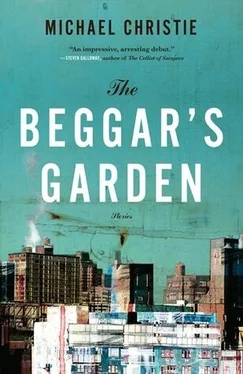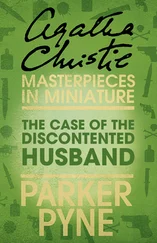Then two years ago Finch was hassled on the way to school by some Hindu kids, and Jerzy and Andrzej went and beat them with leather skipping ropes. Later, people said the Hindus had gang-affiliated brothers and Jerzy got worried. He pulled Finch from school, stabled his crew at the house, and reinforced the doors with sheet metal. At home and bored, Finch pestered his brother to bring him along at nights, a privilege he finally achieved by suggesting he’d be safer with them than at home.
In the idling Benz, Finch considered inventing a story — he was followed, chased by cops — then let it go. Jerzy had a keen ear for fabrication. Yet in other ways his brother was a fool. It’d been two years, no Hindu gangsters, and his paranoia had not abated. Lately, Finch found little inclination to obey his brother, whose darkening demeanour increasingly reminded him of their father. Finch slept on the couch and locked himself in the bathroom to read encyclopedias. Now he saw Jerzy’s warning for what it was: a desperate attempt to force his obedience — a bluff, really, because violence was his only remaining option, one he would never use, if only because their father had employed it with such zeal.
Perhaps it was the bills in his pocket, or the impending reprimand, or the idea of another night on the top bunk, a pillow wrapped about his ears, the bass dispelling any peace he’d gained tonight, that rendered him incapable of leaving the Benz. He dropped it into gear and eased quietly from the curb.
After a string of deliberately unconsidered turns, Finch found himself on a dark freeway, a greenish sea of city light churning on the clouds in his rearview. He wasn’t tired any longer. He felt sharpened and jittery and electric, like he would after emerging from an arcade or drinking a two-litre of discount pop. He supposed he was driving east — west was ocean, south was America — but wasn’t sure. The sedan had a GPS that he didn’t activate for fear it could locate him. Just a short trip, he told himself, luxuriating in the joys of freeway driving: the way speed slowed the landscape, the geometric perfection of banking corners, the cinematic sweep of headlights, the thought of a million engineered parts spinning in unfathomable synchrony.
It was mostly trucks on the road, towns passing like fallen constellations. The night went blacker and Finch bent closer to the wheel. A light appeared in the dash. It looked like a robot pointing a gun to its head. He puzzled over this until a beeping sound came. Something was wrong with the car, and he felt a boy’s sob gather in his chest. Then the same suicidal robot flashed by outside on a sign that read “GAS” and he swerved into the turnoff, nearly throwing the Benz in a ditch.
He came upon a station — an island cut in the blackness by a punishing white light — and pulled in. He’d never kept a car long enough to require fuelling. He studied a man fill his half-ton, then hoisted the heavy nozzle from the pump, unscrewed the cap, inserted the nozzle, and squeezed. Nothing happened.
“Need a hand?” a woman said with a wrecked voice.
“This doesn’t work.”
“You didn’t select your grade,” she said, approaching the pump to smack a button. She gripped the handle and digits spun. She didn’t have a uniform. She wore a filthy puffy jacket and a mountaineering backpack with plastic bags strapped to it. She was middle-aged, about as old as his father had been.
“Oh, hey,” she said, “you gotta kill the engine!”
Finch had never heard of this before. “I can’t,” he said.
Her forehead gathered into ridges. “You can’t?”
“No.”
She glanced around the station. Finch realized then that she was alone and didn’t have a car.
“That’s what they say, anyways,” she said. “Doesn’t bother me.”
“What could happen?”
“Your car could explode!” she said in a voice like a pot bubbling over as she finished pumping. Finch knew that adults often said things they didn’t mean, like how his father had always declared his love for his job at the airport, even though he used to be an engineer in Poland — not the kind that drove trains, but the kind that built them. He hoped what the woman had said was the same sort of thing.
Finch turned to the bright kiosk, the attendant already looking in their direction.
He extracted a brown bill from his track pants. “Can you pay?” he said, his ears turning hot.
“You bet,” she said.
She went in, stood at the counter, and returned with his change.
“Here, keep this,” he said, pushing back a twenty, which she took without thanks.
She paused for a moment. “Actually, I wouldn’t hate a ride,” she said.
The attendant was outside now, inspecting pumps and scribbling on a clipboard. Finch itched to escape the brilliant scrutiny of the lot. He was old enough to know there was no respectable reason for a woman to be stranded at a freeway gas station, but in her face he caught the same desperation, the same doe-like vacancy, he had seen in the girls Jerzy’s boys brought over, or the glitzy women his father shepherded home from clubs, and in this he took a strange comfort. He popped the trunk and she tossed her bags in with the golf clubs.
“Where you going?” he said, merging onto the freeway.
“Just to Merritt,” she said. “My kid—” then her breath cut off like a valve and she turned her face to the window.
Finch vowed off more questions and watched the gas needle’s deliberate rise.
“This is a whole lot of vehicle you got here,” she said, eyeing the pillow beneath him.
“My brother’s,” he said, checking his mirrors.
Then a quiet overtook them, and Jerzy loomed in Finch’s mind. He was going to be furious, more so if he found out Finch had picked up a hitchhiker. Finch could see no boundary in his brother between anger and concern. Jerzy would either kick him out or further tighten his grip, neither of which seemed possible to endure. Finch just needed a little more time in the car, to think. He’d come up with a way to fix everything.
“You talk funny,” she said as though he’d just spoken.
“I have an accent,” he said, recalling for a second the blunt sweetness of his father’s voice, when he did not raise it.
“I mean you whisper,” she said, unwrapping a new pack of cigarettes, lighting one with a barbecue lighter pulled from her coat.
“I don’t like noise.”
“Makes sense, sweetie.”
She reached for the radio and a bright breeze of enveloping sound — a hive of guitars, organs, and voices — leapt from speakers hidden on every side. Soon she began twisting in her seat, throwing her head in odd ellipses, unwashed hair draping into her eyes.
Finch tried not to let her see him looking. He’d never before driven with a passenger, never with a real destination either. He liked her there beside him, this dancing woman. He knew the car would have exploded by now if it was going to. It was the last sedan he would get, but they had three hundred dollars, a gas gauge that promised more than full, and he was taking her to Merritt, wherever that was.
As they shot through the dead-flat valley, with dawn lifting shadows from the weary shoulders of everything, the music reached out through the lightly tinted windows of the Benz, touched the signs and trucks and sulfurous lights and roadside buildings of no discernable purpose, enmeshed itself with this whipping landscape, enlivened it, and Finch was met by an unfamiliar and almost stupefying sense of beauty.
“I like this,” he yelled into the fury.
“Sure you do,” she yelled back. “It’s a classic.”
Sam Prince lay awake, listening to a squad of raccoons loot his recycling. Since moving into the slumping structure behind his house — it backed onto the alley and was either a shed or a small garage, he’d never been sure — he’d taught himself to distinguish the noise of the raccoons licking his containers clean from the more orderly clanking of the men who came on trailered bikes to rummage his blue bins for anything they could return for deposit. There, in the interminable dark hours of recent weeks, Sam had come to the fearful knowledge that the alley doubled as a nocturnal highway where all valuable things were to be carted away.
Читать дальше












